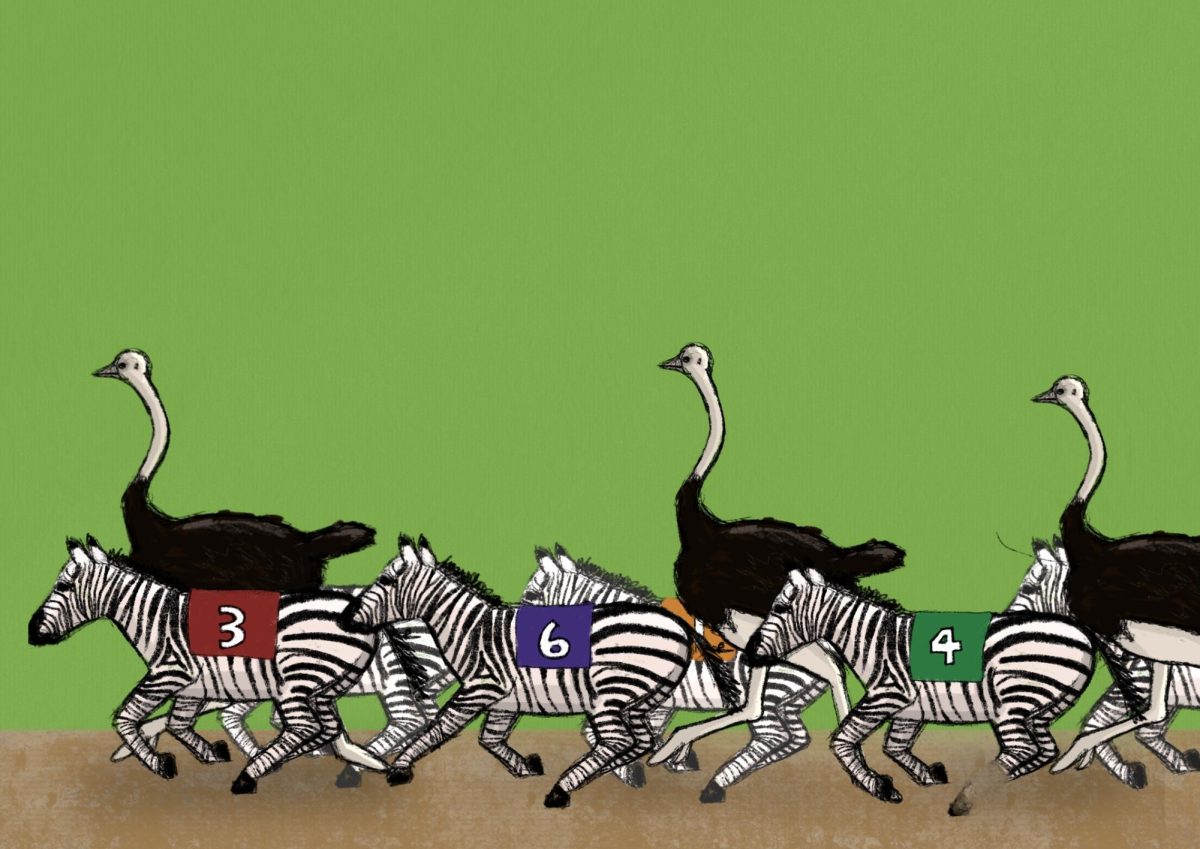There was an exotic animal race last month at the Fair Grounds Race Course & Slots, in which jockeys mounted ostriches, zebras and camels and yanked them along the track for 100 yards or so, to the delight of a few thousand drunken college kids in the bleachers. I was not surprised at the outrage.
There were protesters outside the stadium, many Tulanians abstained from the races and one of my co-writers questioned the ethics of all animal racing, including that of horses. So it is at great peril that I suggest that, though animal racing is no good thing, there are worse evils under the sun, to which all the outrage might be more aptly applied.
I could not convince a camel, much less a zebra or an ostrich, that it should be forced to carry a jockey along a racetrack — and not only because of the language barrier. Those animals do not belong on the racetrack. During the race at the Fair Grounds — yes, I was there — the camels and zebras looked miserable, while the ostriches, perhaps because they had no idea they were even in a race, seemed to bear the ordeal with a cool indifference. None of them, in any case, had a good time — nor do I think they would have viewed the race in a more sympathetic light if they knew that they were upholding a Tulanian tradition.
But even if we consider the race, to use the protesters’ favorite word, inhumane, we should remember that the animals only must bear this inhumanity for 30 seconds, once a year. They do not train beforehand, as was clear from their ineptness in the race. Their inexperience makes for a less pleasant spectacle on the day of the race because the jockeys have to correct their direction every five seconds. But to train them would be more abusive. It would only lengthen their torture. If they are not meant to race, then the less time they spend on the track, the better.
Horses have it much worse. For them, racing is a full-time job. They look fine doing it, but at the cost of rigorous training. Their races draw less concern than those of exotic animals because they seem built to gallop along a track, yet their grace comes at the cost of a perilous existence, which ends with a bullet to the forehead the second their legs stop working. Animal rights activists could make better use of their time at horse races that happen daily than at the exotic animal races that happen once a year.
The reader might expect me, especially after that touching account of the existence of horses, to permit the racing of exotic animals only. But I am not sure that horses would be better off if they stopped racing, so I cannot advise the protesters to pursue that end, even if it would be more worthwhile than their present business with the ostriches.
Miserable though it is to be raced for a living, there are millions of cows, pigs and chickens now confined to slaughterhouses who would gladly put on a saddle and change places with the horses. Of all farm animals, we should remember that horses are treated the best — I have never heard of a farmer brushing a pig’s hair. All horses have names and are favored in many households over dogs and cats. Above all, horses do not, like their kinfolk, have to worry about being served at a dinner table. They owe this privilege to their legs, to their importance as a commodity in racing.
Besides their social status conferred by racing, there is no reason that horses should not be eaten. Without claiming expertise on the nutritional value of animals, I imagine a horse could feed a human quite well; one does not need to be in the Donner Party to see that. It would be hard to explain to an alien, who has never been to the races, why we feed on all other farm animals yet spare horses. Horses would seem, after cows, to provide the most sustenance.
Their social status alone has kept horses off the meat shelves. They have always had a perceived gentility that a chicken could only dream of, the peak of which was during the early modern era, when they were used to pull carriages, carry generals into battle and race jockeys to glory.
Now that cars and tanks have nullified the first two uses, the only thing distinguishing horses from their brethren are races, without which their prestige would sink to the level of swine’s. Ban horse-racing, and the chickens and cows will soon have to make room in the slaughterhouses. So, crazy as it sounds, racing is good for horses — or at the very least, banning it would be bad for them. For the animals’ sake, the races must go on.



